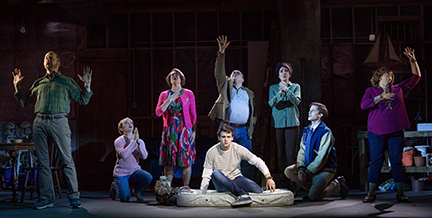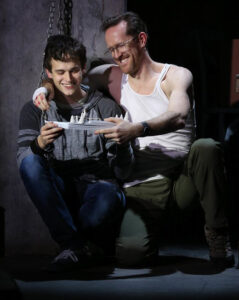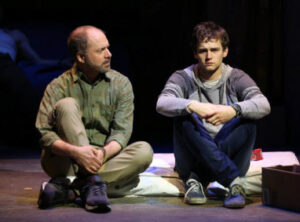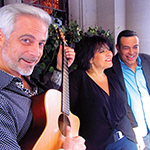Kid Victory
 Ambitious, intelligent, and beautifully nuanced, Kid Victory—by John Kander and Greg Pierce—is the most intriguing new musical I’ve seen in a long time. It is playing a limited engagement at the Vineyard Theatre, Off-Broadway in New York City, through March 19th. I hope a way can be found for it to extend or transfer—perhaps to a small Broadway house—because it is far too important a work to have only a four-week run. It is not a “happy,” “feel-good,” commercial kind of show. It will not be every person’s cup of tea. But it is a significant, honest, insightful and often surprising new musical. It kept me interested throughout. Kander’s music is good for my soul. (No living theater composer has given me more pleasure.) I’m eager to see Kid Victory again, and eager to become familiar with the cast album.
Ambitious, intelligent, and beautifully nuanced, Kid Victory—by John Kander and Greg Pierce—is the most intriguing new musical I’ve seen in a long time. It is playing a limited engagement at the Vineyard Theatre, Off-Broadway in New York City, through March 19th. I hope a way can be found for it to extend or transfer—perhaps to a small Broadway house—because it is far too important a work to have only a four-week run. It is not a “happy,” “feel-good,” commercial kind of show. It will not be every person’s cup of tea. But it is a significant, honest, insightful and often surprising new musical. It kept me interested throughout. Kander’s music is good for my soul. (No living theater composer has given me more pleasure.) I’m eager to see Kid Victory again, and eager to become familiar with the cast album.
Jeffrey Denman
The bracing story, jointly created by Kander and Pierce, deals with a Midwestern youth who’d been abducted by a deranged predator. He is back home, after being gone for almost a year. His rigid, highly religious mother wants everything “back to normal”—with his returning to school, church, his old friends and girlfriend—as soon as possible. But it is not easy for him to even speak to anyone, and he hasn’t yet sorted out his own feelings. Others seem far more certain than he as to what he should be doing with his life. This is the only musical I’ve ever seen in which the protagonist—who’s often feeling trapped—doesn’t get to sing at all, while everyone else does. Flashbacks gradually show us more and more of what he experienced in the time he was away. I don’t want to write more plot details, because I don’t want to spoil the surprises for potential audience members.

The nine actors, directed by Liesl Tommy, have been very well cast: Karen Ziemba, as the youth’s mother and Daniel Jenkins, as the father, helped give the show a firm foundation from the start. Newcomer Brandon Flynn carries off well the demanding role of the youth who’s struggling with so much. Dee Roscioli added warmth and comic relief. Jeffrey Denman handled persuasively the role of the captor. And newcomer Blake Zolfo shone brightly in a small but essential role. He also gets to sing and dance with great insouciance, one of the best numbers in the score, “What’s the Point?.”





